Climate change in Turkey
Climate change in Turkey is the changes in the climate of Turkey due to ongoing 21st century temperature rise, and national responses to those changes. Turkey's annual and maximum temperatures are rising.[1][2] It is one of the countries which is being most affected by climate change,[3][4] which is causing more droughts[5] and extreme weather.[6]
Current greenhouse gas emissions by Turkey are 1% of the global total[7] and are forecast to rise substantially,[8] because the energy policy of Turkey is to heavily subsidize coal in Turkey.[9] Turkey is one of the few countries that has signed but not ratified the Paris Agreement, in other words it is a signatory but not one of the parties to the agreement.[10] In 2020 the government said that, as a developing country having less than 1% responsibility for historical greenhouse gas emissions, Turkey’s position under the United Nations Framework Convention on Climate Change and Paris Agreement was not fair at all.[11]
The Environment Ministry co-ordinates adaptation to climate change, and this has been planned for water resources by river basin, and for agriculture.
Greenhouse gas emissions
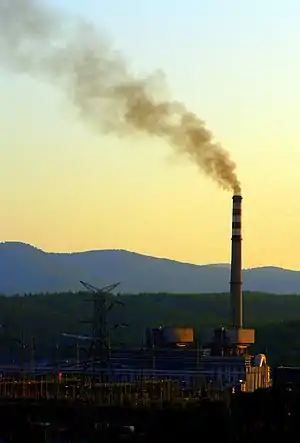
Turkey emits about 500 million tonnes of human-made greenhouse gas (GHG) every year, which is around one percent of the world's total. Greenhouse gas emissions by Turkey are mainly carbon dioxide (CO
2) from burning coal, oil and natural gas. Most coal is burnt in the nation's power stations. Oil is refined and fuels almost all Turkey's cars, trucks. and planes, Natural gas heats buildings and generates electricity. Growing forests take up some carbon dioxide, but not nearly as much as is being discharged into the air.
2O) is emitted, but they are more potent than carbon dioxide in the short-term. Methane leaks from some coal mines and is belched by cattle. Nitrous oxide is given off by manure and fertilised soil. Whereas carbon dioxide emissions stay in the atmosphere for centuries, methane is broken down in years and nitrous oxide in decades. In 2019 of emissions by country Turkey was the 15th largest emitter,[13] and the main influence on emissions is the government through national policy on energy, construction, transport, and agriculture.
Impacts on the natural environment
There were 2 significant periods of climate change in the Bronze Age.[14] According to Prof. Dr. Murat Türkeş, a member of the board of Boğaziçi University’s Center for Climate Change and Policy Studies, modern climate change in Turkey started in the 1970s.[15]
Temperature and weather changes
The 2011 National Action Plan on Climate Change said that the average annual temperature is estimated to rise by 2.5 °C to 4 °C.[16][17] Turkey is forecast to be more severely affected than many other countries,[18][19] and effects to vary considerably across the regions of the country.[20]
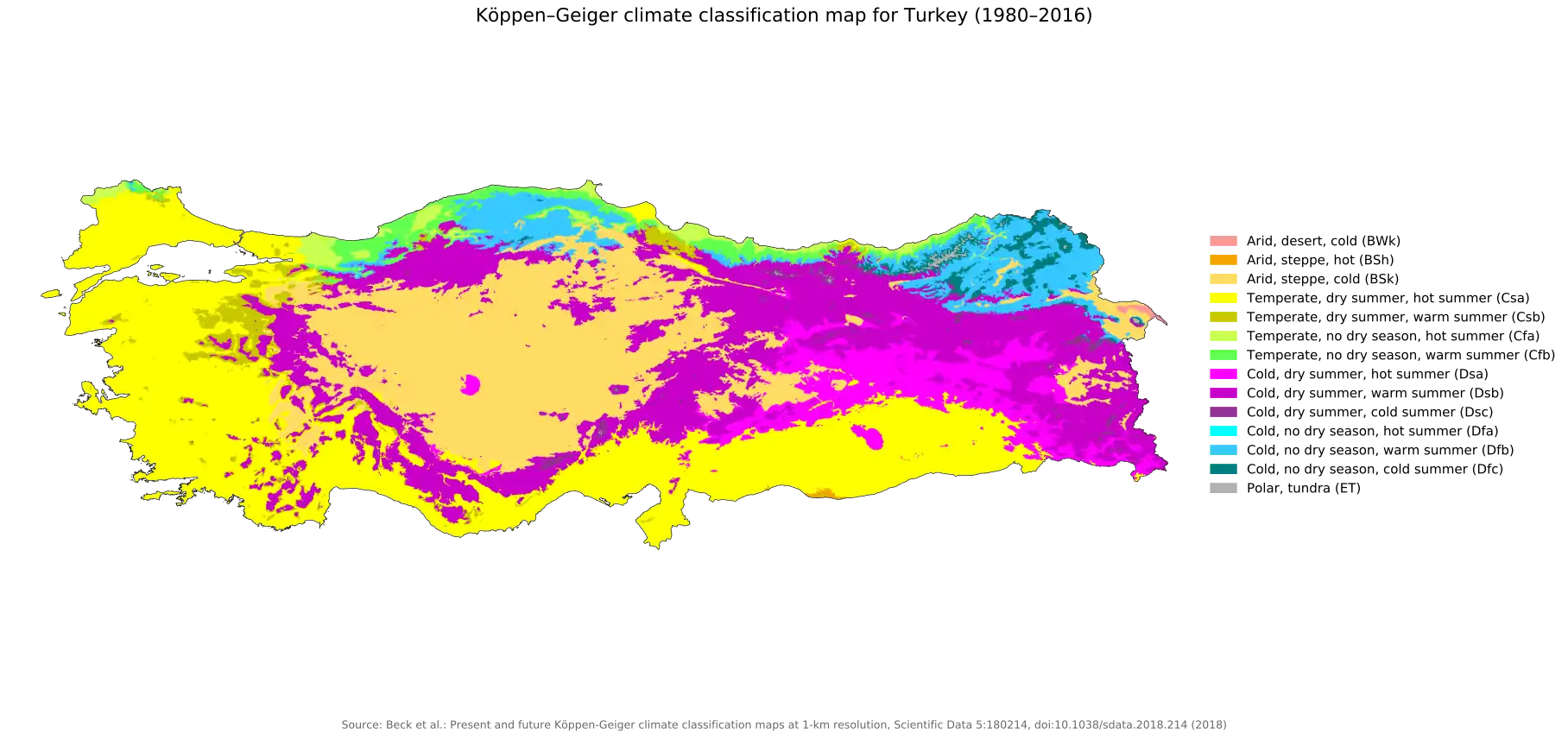
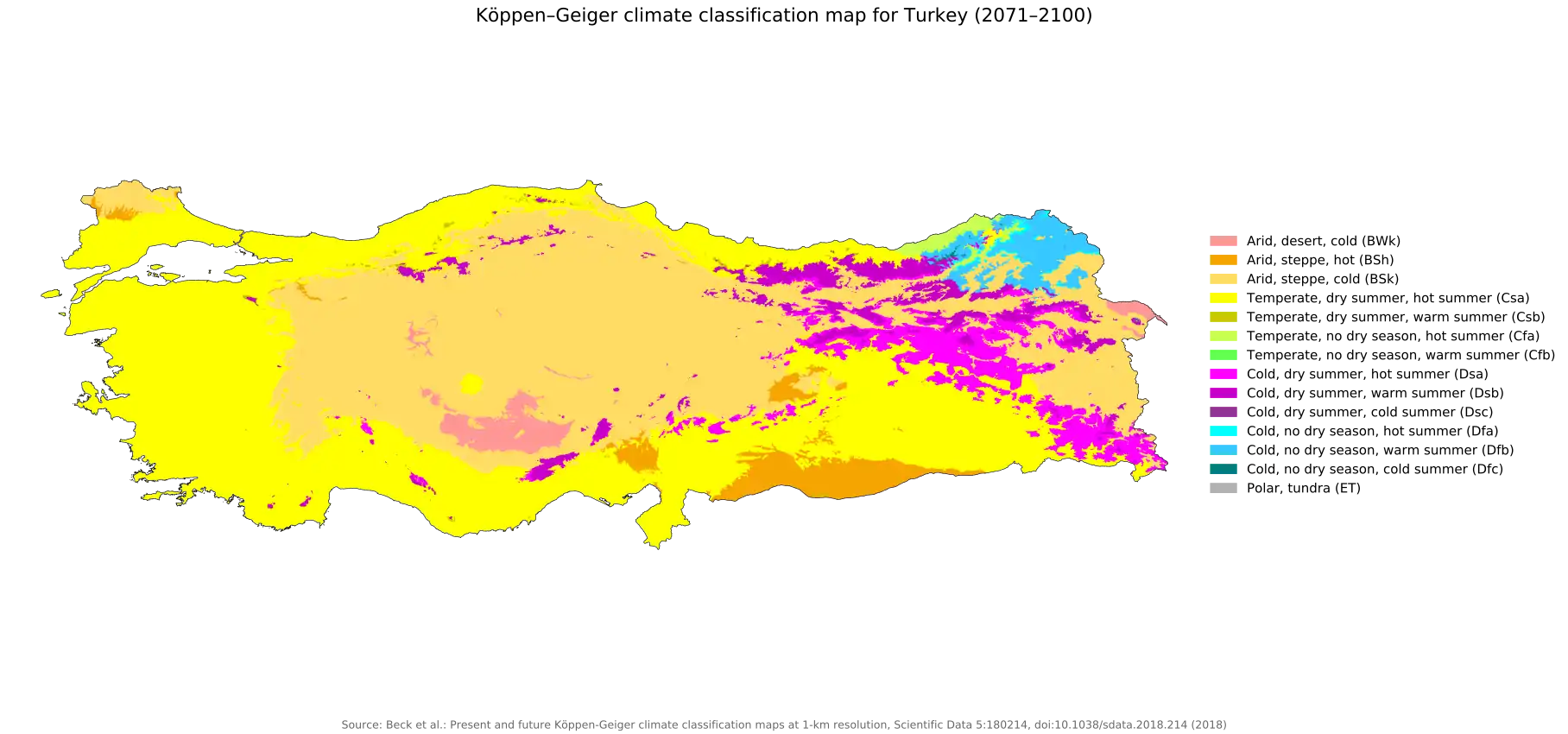
In May 2020 there were record high temperatures in many parts of the country.[21] The weather is becoming more extreme.[6] During the 21st century temperatures are forecast to rise by 2-3 °C on average and precipitation to significantly reduce.[22] However, as well as more droughts more floods are predicted, due to rain falling instead of snow.[23] The worst case is a 7 degree rise by 2100.[24]
Wildfires in Turkey have increased[25] due to climate change.[26]
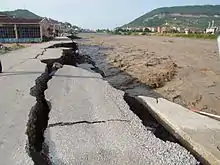
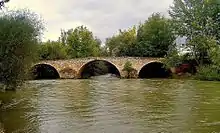
Another effect that might occur as a result of climate change is floods due to sudden rains. According to the international disaster database (EM-DAT), 1,350 people died because of floods between 1970 and 2014 in Turkey and about 2 million people were affected by those floods.[19] Droughts risk mosquito borne diseases.[27]
Urban heatwaves,[28] droughts,[29] storms,[30] and flooding,[31] may increase.[32]
Sea level rise
Sea level rise is forecast to affect city infrastructure, for example Istanbul Kadıkoy metro station is threatened with flooding.[23]
Coastal
Climate models predict that extreme weather events will increase in the Mediterranean.[35]
Mountains
.jpg.webp)
Glaciers in Turkey including the glaciers on Mount Ararat are retreating.[36]
Plant life
2020 had a hotter December than before, and trees bloomed in Istanbul, which is not normal.[37]
Animal life
There are concerns of bears in the Black Sea region not hibernating.[38]
Impacts on people
Economic impacts
Floods in 2020 caused billions of lira in damages.[39] In 2020, the expert on climate change, Murat Türkeş told Hürriyet newspaper: “We have the statistics, climate change and global warming have hit us. We face a loss of millions of dollars.[40] Even new great damages await,”. Loss in Gross Domestic Product per capita by 2100 is forecast to be less than 1% for slight global warming (RCP2.6 Scenario) but almost 8% for severe global warming (RCP8.5 Scenario).[41]
Agriculture and food production
Agriculture and food production are predicted to be greatly affected after the 2030s. Irrigated agriculture in particular will decline as water stress increases. A significant decline in agricultural production is transmitted throughout the economy and reduces national welfare.[42]

Unless global emissions are greatly reduced agriculture in Turkey, such as wheat,[43][44] is expected to be severely affected after the late 2030s especially in areas with rain fed agriculture.[45] Arid and semi-arid areas are at risk of desertification.[4] Irrigated agriculture will decline as water stress increases and increasing food imports will hit Turkey's trade balance.[45] Damage to agriculture [46] is predicted to greatly increase.[45] Pine nut production has been severely reduced.[47]
According to Professor Barış Karapınar, water is lost through evaporation due to old-fashioned irrigation techniques used by the Southeastern Anatolia Project, increasing the risk of severe water shortage.[48]
Hydropower
Reduced precipitation[49] and hydroelectricity in Turkey is forecast.[50]
Fisheries
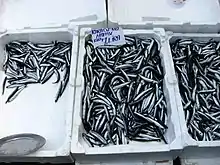
The warming of Lake Van is reducing oxygen for pearl mullet.[51] According to the Food and Agriculture Organization of the United Nations, fishing-oriented sectors in the Black Sea Region of Turkey are argued to be sensitive to the impacts of climate change.[52]
Migration of people
Impacts on housing
(Note: include here impacts in cities, urban and rural environments)
Health impacts
Climate change may impact health in Turkey, for example due to increased heatwaves.[53]
Adaptation
Governmental efforts
A national strategy and action plan for adaptation to climate change was published in 2012,[54] but Turkey has yet to submit a National Adaptation Plan to the UNFCCC.[55]
In 2019 the OECD recommended that adaptation efforts be increased.[56] An international conference on local actions was held, and work on 12 regional adaptation plans continued.[57][58] Protection of water resources and soil quality was considered.[59] The Ministry of Environment and Urban Planning coordinates activities to combat climate change in Turkey.[54] The National Strategy on Climate Change (2010 / 2011-2020), developed under the coordination of the Ministry of the Environment and Urbanization, through an effective work process with the participation of public institutions, establishments of the private sector, non-governmental organizations and universities, was approved by the Superior Planning Council of the Prime ministry on May 3, 2010.[54] This national strategy and action plan for adaptation to climate change focuses on five important areas which are: Water resources management, Agricultural sector, and food security, Ecosystem services, biodiversity and forestry, natural disaster risk, and public health. They are supported by technical and scientific studies and participatory processes.[60]
National adaptation measures continue to progress since the publication of Turkey's sixth national communication in 2016. In its National Adaptation Policies and Strategies, progress has been made at the national level, in local administrations, and in different sectors. Indeed, the regulation on a strategic environmental assessment (SEA) came into force in 2017. In the strategic plans for the periods between 2013 and 2017 and between 2018 and 2022 of the Ministry of the Environment and Urbanization, climate change mitigation and adaptation activities are among the main strategic objectives, assisting municipalities and district authorities in their studies and carrying out various capacity building and support activities in adaptation to changing climate. While private and voluntary sector organizations make significant contributions to studies on adaptation to climate change, provinces and regions have recognized the need for adaptation and have made investments to support adaptation initiatives.[61]
As part of capacity building, education, and information dissemination, projects such as the project “Strengthening joint efforts required for climate action” were implemented in 2017. Also, thanks to a grant program of 37 other projects support the Ministry of the Environment and Urbanization with a vast training program, communication with climate-related stakeholders, awareness-raising activities as well as local actions on climate change in terms of a better response to climate problems are being achieved. For example, a “Climate Change Awareness Project” was carried out by Yıldırım Beyazıt University between 2015 and 2017 for students and teachers of primary and secondary schools operating within the Ministry of Education. [61]
Regarding implementations and actions, the impacts of climate change on surface water and groundwater for individual water basins have been identified, and adaptation activities have been determined. The implementation area of the project is 25 river basins covering the whole of Turkey, and the projection period covers the years 2015 to 2100. Many other projects like Increasing Storage Capacity ( Since the end of 2017, 1258 storage sites have been built and investments are being made. 727 dams are aimed to be completed by the end of 2023); Lake-Water Project; Basin Protection Action Plans; Transforming Basin Protection Action Plans to River Basin; Management Plans; Studies on Protecting Drinking Water Basins; Drought Management Studies; Saving Water in Irrigation; Distribution of Water Among Sectors have been built.[62]
To fight against climate change in agriculture studies done about adaptation to climate change with various applications like fighting agricultural drought, good agriculture applications, and organic agriculture. Many projects have been put into practice. We can cite: Turkey’s Strategy of Fighting Agricultural Drought and Action Plan (2018-2022); Agricultural Monitoring and Information (TARBIL) System; Agriculture and Rural Development Support Institution (TKDK); Agricultural Insurance Law; Developing Agricultural Publication Project (TAR-GEL); Studies of Fighting Erosion; Climate Change National Action Plan-Agriculture Sector. [63]
In addition, these projects, programs, and studies require a lot of funding. Turkey is already receiving international funding despite not having ratified the Paris Agreement. It was even revealed that Turkey was the fifth-largest recipient of multilateral climate funds between 2013 and 2016, receiving $231 million through channels such as the Clean Technology Fund (CTF) and the Global Environment Facility (GEF).[55]
Xeriscaping of green spaces in cities has been suggested,[64] and Istanbul has a climate change action plan.[65] However, according to a 2018 study by Trakya University more local climate change action plans need to be prepared urgently.[66]
Private sector efforts
In the 1990s independent media outlet Açık Radyo (Open Radio) was one of the first to cover climate change, and its founder Ömer Madra(in Turkish) emphasises "The three Y’s in the fight on climate change: Yerel (local) Yatay (horizontal, not vertical) and Yavaş (slow, no resort to violence)."[67] İklim Haber is another active source for the coverage of climate change issues for the readers in Turkey. They describe their operations as "focusing on latest developments from the areas of climate science, climate policy, and the economy of climate change by trying to publish the news objectively and data-oriented." [68]
The arts are raising awareness of climate change, and education is supported by the EU.[69][70]
Public responses
Individual action on climate change is not properly understood (in a survey of primary school teachers many erroneously prioritised using less cosmetics) and neither are government choices on climate change mitigation (in the same survey only a minority correctly prioritised curbing fossil fuel use).[71] Future warming of seawater by Akkuyu Nuclear Power Plant is wrongly thought by some to be relevant to climate change,[20] and few know that geothermal power in Turkey might emit considerable CO
2.[72]
In 2018, Turkish climate news hub İklim Haber and Turkey’s leading polling company Konda Research asserted that: "there is a wide public consensus about climate change (86%) and the majority (%75) of the population say that they are concerned about climate change. The research points out that Turkey’s energy sources of preference are solar and wind energy by a large margin." in the report of "Climate Change Perceptions and Energy Preferences in Turkey".[73] According to the latest report written in Turkish and prepared by another collaboration of İklim Haber and Konda Research in 2020, 51,5% of the public opinion believe that the climate crisis is a bigger threat than the Coronavirus crisis. Also, 71,4% of the public opinion acknowledge that current climate crisis is a result of human activities.[74]
In 2019 some Turkish schoolchildren joined the School strike for climate,[75] and Turkey's branch of Extinction Rebellion demonstrated for Turkey to ratify the Paris Agreement.[76]
Muslim environmentalists and academics quote the Quran in support of their environmentalism.[77] In Istanbul in 2015, Islamic leaders urged the world's 1.6 billion Muslims to help defeat climate change.[78][79]
Sources
- Turkey, Country Profile (Report). Climate Transparency. 2020.
- Gümüşel, Deniz; Gündüzyeli, Elif. The Real Costs of Coal: Muğla (Report). CAN Europe.
- Şahin, Ümit; Türkkan, Seçil (January 2019). "Turkey's Climate Policies Have Reached a Deadlock: It Takes Courage to Resolve It" (PDF). saha. Vol. Special Issue 2. pp. 24–30. ISSN 2149-7885.
- Seventh National Communication (version 2) of Turkey under the UNFCCC (this is also the third biennial report). Ministry of Environment and Urban Planning (Report). August 2019.
- OECD (February 2019). "OECD Environmental Performance Reviews: Turkey 2019". OECD. OECD Environmental Performance Reviews. doi:10.1787/9789264309753-en. ISBN 978-92-64-30974-6.
- Republic of Turkey Climate Change Action Plan 2011 - 2023 (PDF) (Report). Ministry of Environment and Urbanization General Directorate of Environmental Management Climate Change Department. 2012.
- Turkish Greenhouse Gas Inventory report [TurkStat report]. Turkish Statistical Institute (Report). April 2020.
- Turkey's fourth biennial report. Ministry of Environment and Urban Planning (Report). December 2019.
References
- Şen, Prof. Dr. Ömer Lütfi. "Climate Change in Turkey". Mercator-IPC Fellowship Program. Retrieved 16 September 2018.
- "Monthly and Seasonal Trend Analysis of Maximum Temperatures over Turkey" (PDF). International Journal of Engineering Science and Computing. 7 (11). November 2017. Retrieved 16 September 2018.
- "Turkey battles climate change: Nationwide efforts give hope for the future". Daily Sabah. 11 October 2018.
- "Küresel ısınma". Kocaeli Province water board. Archived from the original on 16 September 2018. Retrieved 16 September 2018.
- "Turkey drought: Istanbul could run out of water in 45 days". The Guardian. 2021-01-13.
- "Extreme weather threatens Turkey amid climate change fears". Daily Sabah. 17 May 2018.
- "Each Country's Share of CO2 Emissions". Union of Concerned Scientists. Retrieved 16 September 2018.
- "Brown to Green: G20 Transition to a Low Carbon Economy" (PDF). Climate Transparency. Retrieved 16 September 2018.
- "Fossil Fuel Support - TUR", OECD, accessed September 2018.
- "Statement of the Spokesperson of Ministry of Foreign Affairs, Mr. Hami Aksoy, in Response to a Question Regarding Turkey's Putting on the Record its Determination to Obtain a Fair Position Under the International Climate Change Regime in the G20 Leaders' Declaration". Ministry of Foreign Affairs (Turkey). 22 November 2020. Retrieved 2020-12-13.
- Gümüşel & Gündüzyeli (2019), p. 8.
- "With climate absent from Ankara's agenda, Turkey's Greens sense an opening". POLITICO. 2020-10-27. Retrieved 2020-11-18.
- October 30; 2020. "Study: Ancient people in Turkey adapted to climate change". Cornell Chronicle. Retrieved 2020-11-11.CS1 maint: numeric names: authors list (link)
- "Turkey in the midst of climate change, says climate expert - Turkey News". Hürriyet Daily News. Retrieved 2020-11-11.
- Tokuç, Burcu (May 2019). "Which Threats to Global Health Pose a Problem for Turkey's Health?". Balkan Medical Journal. 36 (3): 152–154. doi:10.4274/balkanmedj.galenos.2019.2019.3.001. ISSN 2146-3123. PMC 6528528. PMID 30821137.
- "Küresel İklim Değişikliği ve Türkiye | WWF". www.wwf.org.tr. Retrieved 2020-11-30.
- "Warming a Frozen Policy: Challenges to Turkey's Climate Politics After Paris". Turkish Policy Quarterly.
- Turkey's Seventh National Communication and Third Biennial Report to United Nations Framework Convention on Climate Change (PDF). Republic of Turkey Ministry of Environment and Urbanization. Retrieved 2 November 2018.
- İkli̇m Deği̇şi̇kli̇ği̇ni̇n Yerel Etki̇leri̇ Raporu (PDF). TEMA Vakfı Proje Ekibi WWF-Türkiye Proje Ekibi. March 2015. ISBN 978-975-7169-77-2.
- "Environmental developments in Turkey during 2020".
- Ministry of Environment and Urbanization (2016), p. 22
- "Temperature to increase significantly in Turkey in 30 years due to global warming, warns climate expert". Hürriyet Daily News. 19 March 2018.
- "Climate change triggers extreme weather in Turkey". DailySabah. Retrieved 2019-10-01.
- Ward, Lyn (2019-08-27). "Climate change and wildfires - a vicious circle". Fethiye Times. Retrieved 2019-09-04.
- "Deforestation prevention key to fight climate change - Turkey News". Hürriyet Daily News. Retrieved 2019-10-01.
- SABAH, DAILY (2020-12-28). "Mosquito takeover in possible drought prompts disease concerns for Turkey". Daily Sabah. Retrieved 2021-01-02.
- "Turkey reeling from African heat wave". Daily Sabah. 2 July 2017.
- "Gov't forced to take measures amid below average rainfall across Turkey". Hürriyet Daily News. 21 January 2018.
- "Lightning electrifies Istanbul, northwestern Turkey skies as thunderstorms take over". Daily Sabah. 24 July 2018.
- "Istanbul flood result of Turkey's climate change". Anadolu Agency. 27 July 2017.
- Şen, Ömer Lütfi. "Climate Change in Turkey". Mercator-IPC Fellowship Program. Retrieved 27 September 2018.
- Dr. Nuran, Talu (2019). "LOCAL CLIMATE ACTION PLANNING AND PRACTICES IN TURKEY" (PDF).
- Afshar, Mehdi H.; Şorman, Ali Ünal; Tosunoğlu, Fatih; Bulut, Burak; Yilmaz, M. Tugrul; Danandeh Mehr, Ali (2020-08-01). "Climate change impact assessment on mild and extreme drought events using copulas over Ankara, Turkey". Theoretical and Applied Climatology. 141 (3): 1045–1055. Bibcode:2020ThApC.141.1045A. doi:10.1007/s00704-020-03257-6. ISSN 1434-4483.
- Seventh communication (2019), p. 151.
- Baldasso, V.; Soncini, A.; Azzoni, R.S.; et al. (2018). "Recent evolution of glaciers in Western Asia in response to global warming: the case study of Mount Ararat, Turkey". Theor Appl Climatol. 137 (1–2): 45–59. doi:10.1007/s00704-018-2581-7. S2CID 125700008.
- "Experts warn of climate change in Turkey as trees bloom early - Turkey News". Hürriyet Daily News. Retrieved 2021-01-02.
- DHA, Daily Sabah with (2020-12-23). "Bears choosing not to hibernate due to climate change raises concerns in Turkey". Daily Sabah. Retrieved 2021-01-02.
- "Turkey: Pandemic stresses need for green transformation".
- "Turkey in the midst of climate change, says climate expert - Turkey News". Hürriyet Daily News. Retrieved 2020-11-11.
- Matthew E. Kahn Kamiar Mohaddes Ryan N.C. Ng M. Hashem Pesaran Mehdi Raissi Jui-Chung Yang (August 2019). "Long-term Macroeconomic Effects of Climate Change: a Cross-country Analysis" (PDF). NBER Working Paper Series.
- Dudu, Hasan; Çakmak, Erol H. (2018-04-03). "Climate change and agriculture: an integrated approach to evaluate economy-wide effects for Turkey". Climate and Development. 10 (3): 275–288. doi:10.1080/17565529.2017.1372259. ISSN 1756-5529.
- "Reducing emissions could mitigate worst effects of climate change, study finds".
- Rojas, Maisa; Lambert, Fabrice; Ramirez-Villegas, Julian; Challinor, Andrew J. (2019-04-02). "Emergence of robust precipitation changes across crop production areas in the 21st century". Proceedings of the National Academy of Sciences. 116 (14): 6673–6678. Bibcode:2019PNAS..116.6673R. doi:10.1073/pnas.1811463116. ISSN 0027-8424. PMC 6452695. PMID 30858318.
- Dudu, Hasan; Çakmak, Erol H. (2018). "Climate change and agriculture: an integrated approach to evaluate economy-wide effects for Turkey". Climate and Development. 10 (3): 275–288. doi:10.1080/17565529.2017.1372259.
- Ağaçayak, Tuğba; Keyman, E. Fuat. "Water and Food Security in Turkey in a Changing Climate" (PDF). Istanbul Policy Center, Sabancı University. Retrieved 16 September 2018.
- "Climate change hits Turkey's richest highland villages". Daily Sabah.
- "Will Turkey's thirst for dam building add an element of combustibility to a regional water crisis?". Equal Times. Retrieved 2020-02-13.
- Turkes, Murat; Turp, M. Tufan; An, Nazan; Ozturk, Tugba; Kurnaz, M. Levent (2020), Harmancioglu, Nilgun B.; Altinbilek, Dogan (eds.), "Impacts of Climate Change on Precipitation Climatology and Variability in Turkey", Water Resources of Turkey, World Water Resources, Cham: Springer International Publishing, pp. 467–491, doi:10.1007/978-3-030-11729-0_14, ISBN 978-3-030-11729-0, retrieved 2020-10-24
- "Increasing Droughts in Turkey are likely to put Pressure on its Hydropower Sector". Future Directions International. 2019-07-03. Retrieved 2019-07-11.
- "Lake Van warms up, threatening ecosystem". Ihlas News Agency. 21 February 2018.
- Impacts of climate change on fisheries and aquaculture : synthesis of current knowledge, adaptation and mitigation options. Barange, Manuel, 1961-, Bahri, Tarûb, Beveridge, Malcolm C. M., Cochrane, K. L., Funge Smith, S. (Simon), Poulain, Florence. Rome. ISBN 92-5-130607-9. OCLC 1078885208.CS1 maint: others (link)
- Akademisi, Türkiye Bilimler (July 2020). The Report on Climate Change and Public Health in Turkey (Report). Turkish Academy of Sciences. ISBN 978-605-2249-50-5.
- "Turkey — Climate-ADAPT". climate-adapt.eea.europa.eu. Retrieved 2020-12-01.
- "The Carbon Brief Profile: Turkey". Carbon Brief. Retrieved 1 October 2018.
- OECD (2019), p. 38.
- "1st International Conference on Local Climate Action". 25 April 2019.
- "Turkey steps up to the plate in fight for environment". Daily Sabah. 2019-07-13.
- "Turkey's National Climate Change Adaptation Strategy and Action Plan" (PDF). General Directorate of Environmental Management, Department of Climate Change, August 2012, Ankara (2nd edition). Ministry of Environment and Urban Planning (Turkey). Retrieved 1 October 2018.
- "Turkey: National climate change adaptation strategy and action plan (2011-2023) - National Policy, Plans & Statements - Turkey - Europe - Countries & Regions - PreventionWeb.net". www.preventionweb.net. Retrieved 2020-12-01.
- Seventh communication (2019), p. 161.
- Seventh communication (2019), p. 162.
- Seventh communication (2019), p. 167.
- Çetin, Nefise; Mansuroğlu, Sibel; Kalaycı Önaç, Ayşe (2018). "Xeriscaping Feasibility as an Urban Adaptation Method for Global Warming: A Case Study from Turkey". Pol. J. Environ. Stud. 27 (3): 1009–1018. doi:10.15244/pjoes/76678.
- "İstanbul İklim Değişikliği Eylem Planı". Retrieved 17 April 2019.
- Yıldırım, Kübra Özcan (2018). "Akademik Kurumlarda Örgütsel Adalet Ve Dişlanma İlişkisi: Araştirma Görevlileri Üzerine Bir Araştirma". Trakya Üniversitesi Sosyal Bilimler Dergisi: 177–194. doi:10.26468/trakyasobed.502209.
- "Local activism at the heart of fight against 'global heating' - Turkey News". Hürriyet Daily News. Retrieved 2020-02-10.
- "Hakkımızda" [About Us]. İklim Haber (in Turkish). Retrieved 2020-11-25.
- "Turkey's stage-struck grannies act to save the planet". 2019-08-29. Retrieved 2019-09-04.
- "Enhancing Required Joint Efforts on Climate Action Project".
- Yalcin, Fatma Aggul; Yalcin, Mehmet (2017). "Turkish Primary Science Teacher Candidates' Understandings of Global Warming and Ozone Layer Depletion". Journal of Education and Training Studies. 5 (10): 218. doi:10.11114/jets.v5i10.2225.
- "Characterizing the declining CO2 emissions from Turkish geothermal power plants" (PDF). World Bank. Retrieved 26 March 2019.
- "Turkey Climate Survey". İklim Haber. Retrieved 2020-11-28.
- "TÜRKİYE'DE İKLİM DEĞİŞİKLİĞİ VE ÇEVRE SORUNLARI ALGISI 2020" (PDF). İklim Haber. November 2020. pp. 12–18. Retrieved 30 November 2020.
- "'When adults fail, we need to take action,' says activist - Turkey News". Hürriyet Daily News. Retrieved 2019-10-01.
- "Extinction Rebellion calls for people to 'rise up' against Turkish government". Morning Star. 16 April 2019.
- Bodetti, Austin. "Why Turkish academic Ibrahim Ozdemir is pushing for an Islamic approach to environmentalism". alaraby. Retrieved 2019-10-01.
- "Islamic Declaration on Climate Change" UNFCCC, 18 August 2015
- "Islamic Declaration on Global Climate Change" (PDF). The Islamic Foundation For Ecology And Environmental Sciences. Retrieved 7 May 2019.
External links
- Istanbul International Centre for Energy and Climate
- Boğaziçi University Center for Climate Change and Policy Studies (iklimBU)
- Turkey-EU project
- European Climate Adaptation Platform (CLIMATE-ADAPT)
- Climate Change in Turkey:Istanbul Policy Center: Sabanci University
- CDP Turkey 2019 Climate Change and Water Report
- Climate Action Network Europe
- Climate Change Post
- Centre for Economics and Foreign Policy Studies (EDAM)
- İklim Haber (Climate News) – Newspaper focusing on climate change
- Climate Laws - Laws, policies and litigation